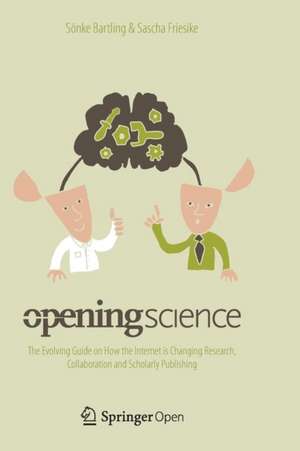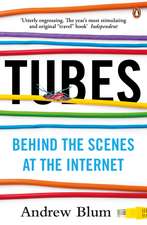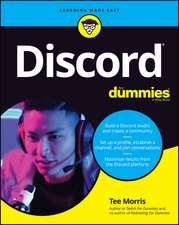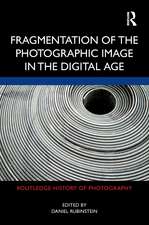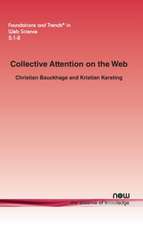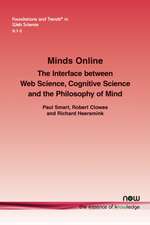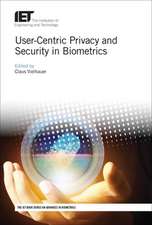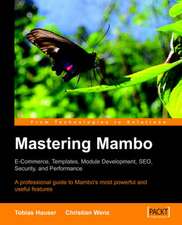Opening Science: The Evolving Guide on How the Internet is Changing Research, Collaboration and Scholarly Publishing
Editat de Sönke Bartling, Sascha Friesikeen Limba Engleză Paperback – 27 aug 2016
| Toate formatele și edițiile | Preț | Express |
|---|---|---|
| Paperback (1) | 424.61 lei 6-8 săpt. | |
| Springer International Publishing – 27 aug 2016 | 424.61 lei 6-8 săpt. | |
| Hardback (1) | 369.94 lei 6-8 săpt. | |
| Springer International Publishing – 10 ian 2014 | 369.94 lei 6-8 săpt. |
Preț: 424.61 lei
Nou
Puncte Express: 637
Preț estimativ în valută:
81.26€ • 84.52$ • 67.08£
81.26€ • 84.52$ • 67.08£
Carte tipărită la comandă
Livrare economică 12-26 aprilie
Preluare comenzi: 021 569.72.76
Specificații
ISBN-13: 9783319342573
ISBN-10: 3319342576
Pagini: 348
Ilustrații: IX, 339 p. 43 illus., 30 illus. in color.
Dimensiuni: 155 x 235 x 19 mm
Greutate: 0.49 kg
Ediția:Softcover reprint of the original 1st ed. 2014
Editura: Springer International Publishing
Colecția Springer
Locul publicării:Cham, Switzerland
ISBN-10: 3319342576
Pagini: 348
Ilustrații: IX, 339 p. 43 illus., 30 illus. in color.
Dimensiuni: 155 x 235 x 19 mm
Greutate: 0.49 kg
Ediția:Softcover reprint of the original 1st ed. 2014
Editura: Springer International Publishing
Colecția Springer
Locul publicării:Cham, Switzerland
Cuprins
Towards Another Scientific Revolution.- Open Science: One Term, Five Schools of Thought.- Excellence by Nonsense: The Competition for Publications in Modern Science.- Science Caught Flat-footed: How Academia Struggles with Open Science Communication.- Open Science and the Three Cultures: Expanding Open Science to All Domains of Knowledge Creation.- (Micro)blogging Science? Notes on Potentials and Constraints of New Forms of Scholarly Communication.- Academia Goes Facebook? The Potential of Social Network Sites in the Scholarly Realm.- Reference Management.- Open Access: A State of the Art.- Novel Scholarly Journal Concepts.- The Public Knowledge Project: Open Source Tools for Open Access to Scholarly Communication.- Altmetrics and Other Novel Measures for Scientific Impact.- Dynamic Publication Formats and Collaborative Authoring.- Open Research Data.- Intellectual Property and Computational Science.- Research Funding in Science 2.0.- Open Innovation and Crowdsourcing in the Sciences.- The Social Factor in Open Science.- Case: Creative Commons.- Case: Collaborative Authoring using Google Documents and Cloud Software.- Case: Unique Identity for a Researcher.- Case: Challenges in Open Data in Medical Research.- Case: On the Sociology of Science 2.0.- Case: How This Book Was Created Using Collaborative Text Editing.- Case: History 2.0.- Case: Making Data Citeable: Datacite.
Recenzii
From the book reviews:
“It is, as the subtitle indicates, an ‘evolving guide,’ valuable to everyone interested in digital scholarship. Summing Up: Highly recommended. All academic and professional libraries.” (S. E. Wiegand, Choice, Vol. 51 (11), August, 2014)
“It is, as the subtitle indicates, an ‘evolving guide,’ valuable to everyone interested in digital scholarship. Summing Up: Highly recommended. All academic and professional libraries.” (S. E. Wiegand, Choice, Vol. 51 (11), August, 2014)
Notă biografică
Dr. Sascha Friesike heads the Open Science research team at the Alexander von Humboldt Institute for Internet and Society. After studying Industrial Engineering at Berlin Technical University and conducting research at Stanford University’s Center for Design Research, he received his Ph.D. from the University of St. Gallen.
Dr. med. Sönke Bartling is an Open Science researcher and radiologist. He leads a basic research group on Personalized Interventional Oncotherapy at the German Cancer Research Center in Heidelberg and is the section head of Translational Medicine at the Department of Clinical Radiology and Nuclear Medicine at the Mannheim University Medical Center.
Dr. med. Sönke Bartling is an Open Science researcher and radiologist. He leads a basic research group on Personalized Interventional Oncotherapy at the German Cancer Research Center in Heidelberg and is the section head of Translational Medicine at the Department of Clinical Radiology and Nuclear Medicine at the Mannheim University Medical Center.
Textul de pe ultima copertă
Modern information and communication technologies, together with a cultural upheaval within the research community, have profoundly changed research in nearly every aspect. Ranging from sharing and discussing ideas in social networks for scientists to new collaborative environments and novel publication formats, knowledge creation and dissemination as we know it is experiencing a vigorous shift towards increased transparency, collaboration and accessibility. Many assume that research workflows will change more in the next 20 years than they have in the last 200. This book provides researchers, decision makers, and other scientific stakeholders with a snapshot of the basics, the tools, and the underlying visions that drive the current scientific (r)evolution, often called ‘Open Science.’
Caracteristici
Closes the gap between those who are online already and who are not Provides with the status-quo and a glimpse at future developments Provides an overview of web 2.0 tools for scientists with concrete how-to’s Introduces the concept of open science Includes supplementary material: sn.pub/extras
